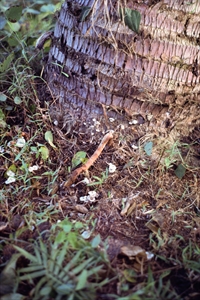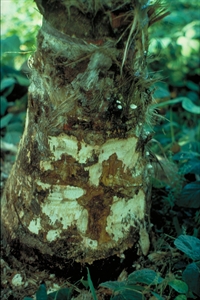- Narrow. Distribution of the associated fungus, (Marasmiellus albofuscus) is not well documented; it is recorded from: Asia (China, Indonesia), North (Hawaii, Florida) and South America (Argentina), the Caribbean (Cuba, Lesser Antilles), Oceania. The disease is reported from Solomon Islands.
- Damage minor on coconut: (i) associated with a superficial, brown, basal trunk rot of mature coconuts, sometimes with white fungal growth and bark cracking; and (ii) non-germination of seednuts and death of embryo.
- Spread: spores on the wind.
- Biosecurity: low quarantine risk as likely the fungus has wide distribution (even though disease is unreported), ; however, whenever coconuts are transferred internationally, the FAO/IBPGR Technical Guidelines for the Safe Movement of Coconut Germplasm should be followed: (http://www.bioversityinternational.org/e-library/publications/detail/coconut/).
- Cultural and Chemical control: none recommended. It appears that coconut basal trunk rot (and embryo rot) are not of economic importance.





